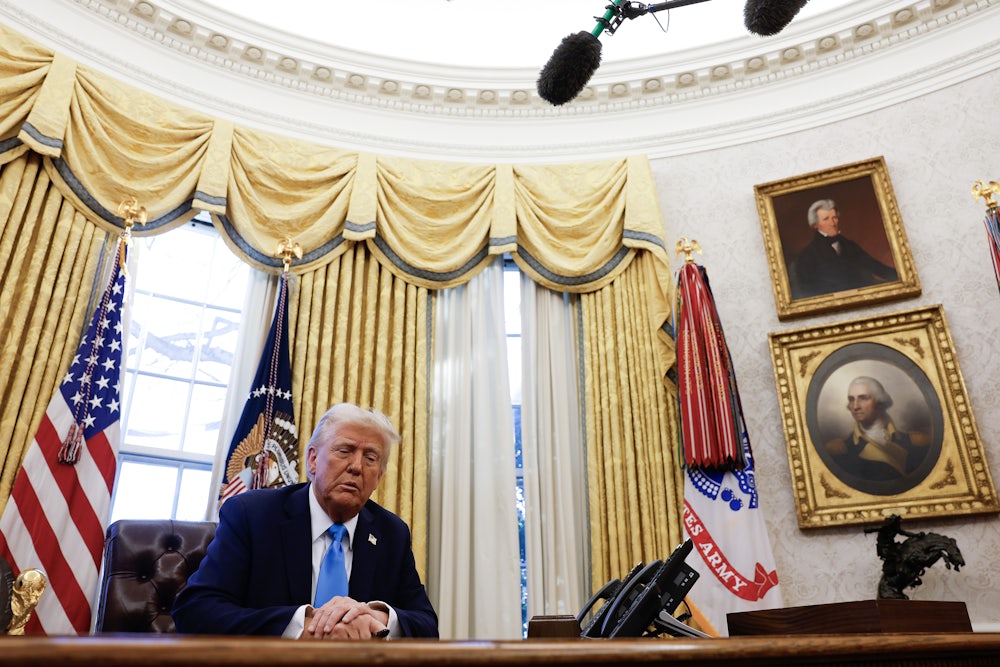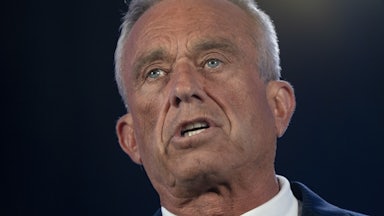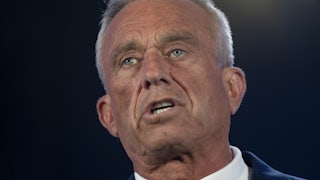Under the grossly misleading title “Ending Radical Indoctrination in K-12 Schooling,” the White House last week issued an executive order that would undermine the integrity of writing and teaching of American history. The order uses ideological litmus tests to define for teachers and students what is acceptable and unacceptable American history. Historians, and all who teach and care about the American past at historic sites, in museums, libraries, publishing, and in social studies and history classrooms should loudly protest this incursion into our schools, our writing, and our minds.
This attempt to censor and restrict the teaching of multiple important topics in U.S. history comes as efforts are ongoing in Washington to cut or ban myriad federal programs and agencies.
Instilling fear is the point of the administration’s assault on history education, as it is also the point of thought control in George Orwell’s 1984. There the protagonist, Winston Smith, finds a “fragment of the abolished past”: a newspaper clipping containing a photograph of former Party leaders proving that their “confessions” for a crime were a lie. He had once hoped this clipping would prove that Big Brother had destroyed accurate but unacceptable history by erasing or altering any information that did not fit his narrative.
But it did not, and later, when he looks at a children’s history book with a picture of Big Brother as the frontispiece, Winston begins to question everything he believed and wonders if the Party might actually be right, even about things that seem obviously false. What if “two and two made five”? “The Party told you to reject the evidence of your eyes and ears,” utters Winston. “It was their final, most essential command.”
As historians and educators, however, we still have our voices and, like Winston, we must shout: “Truisms are true, hold on to that! The solid world exists, water is wet, objects unsupported fall toward the earth’s center.” And we must do this now before it is too late.
History is a reasoned reconstruction of the past, rooted in the deepest evidence we can find, crafted into narratives that inform, educate, and sometimes inspire. History can indeed be influenced by ideological assumptions—they can be argument-driven—but those are the assumptions and tendencies that historians test and control through training in research, in critical thinking, in humility, in respect for sources, in an ethics about documentation, and in the integrity of debate. All this is true of history educators and scholars, and the public’s trust is our ultimate goal, even authority.
The “Ending Radical Indoctrination” executive order is an attempt to undermine that authority in the interest of a manufactured national unity. It violates every instinct, every principle, indeed nearly every method of research and thinking that historians have practiced for at least a century.
Historians often disagree on interpretations, on how much evidence is enough, and on which explanations of the past are most compelling. But we do often reach consensuses on the range of likely possibilities. Our adherence to professional standards allows even those who disagree with one another to help young people understand their country in our books, documentary films, and museum and historic site exhibitions. What our profession most definitely does not believe is that the primary purpose of history is to instill a single notion of “patriotic education” in our youth about “our incredible Nation,” as the order demands.
Humility is not the order of business in Washington just now, nor is factual accuracy. This order audaciously defines “patriotic education” as a history grounded in “an accurate, honest, unifying, inspiring and ennobling characterization of America’s founding and foundational principles.” Lovely words. Yet many of those ennobled, indeed brilliant, Founders would be astonished to see themselves portrayed as utterly unified during the creation of the Constitution, its ratification, and during the turbulent early republic.
Similarly, the order’s assertion that children are being indoctrinated in classrooms and that “parents” generally want their children educated to this narrow patriotic standard is clearly belied by the evidence. Data from a recent survey undertaken by the American Historical Association indicates that people need and desire good, critical history, especially as a buoy in our polarized political culture. Millions of Americans crave reading high-quality, challenging history and biography, especially when it gives them new perspectives and helps them grasp an often troubling and divisive present.
Intended to instill fear in teachers, this order itself ironically seems driven by fear, by a refusal to acknowledge the diversity of our nation and the wounds that cannot be healed until they are understood. And laced throughout is an obsession with sexuality and a moral panic about “gender equity” education. The order prohibits education about “social transition.” The authors seem to want schools and universities to cease to write and teach about gender altogether, a field more than a half-century old and flourishing. They seem confident that if they could just succeed in this particular kind of abolition, along with that of any efforts to trace the history of racism (systemic or otherwise), then American youth could somehow feel unified, confident, and as unperturbed by conflict and suffering elsewhere in the world as they are unaware of such aspects of our nation’s past.
In the imagined era of American virtue at the heart of the executive order, the politicized Supreme Court might be trusted again, violent and lawless people would not be pardoned, Native Americans and their historians might stop reminding us of a bloody past we find it difficult to face. And environmental degradation in the past will no longer sully our unified present. Given how the order requires the Department of Education to fund the revival of the 1776 Commission to plan the “celebration” of America’s 250th anniversary, the Department of Defense to engineer history programs, and the National Park Service to be complicitous in often vacuous patriotic public history programs, should we begin now to gut the most interesting exhibitions at the Smithsonian Museum of American History or at the National Portrait Gallery?
Using the order’s twisted logic, should we consider a complete revision or abolition of the National Museum of African American History and Culture? Its massive audiences have clearly not learned sufficient love of country from visiting those divisive halls. Should we plan to tear down the Vietnam Veterans Memorial that bears witness to a war that tore America apart and thereby protect our youth from such knowledge? What will we do with the Franklin D. Roosevelt Memorial or the Martin Luther King Jr. Memorial and their immortal words carved in stone from truly conflicted pasts that we collectively, mostly survived? The Lincoln Memorial would have to scrub its reference to “every drop of blood drawn by the lash,” not to mention “this mighty scourge of [Civil] war,” whose legacies still haunt us.
But the threats to history do not stop there. Could many of our most prominent history centers and museums be scrutinized for their devotion to “accurate, honest,” and “unifying” history as narrowly defined by the order? Will this administration revisit the National Park Service’s thoughtful and informed approaches to American history? Will it shut down the more than 20 Civil War battlefield sites, visited by thousands, since those visitors may learn something about how slavery destroyed the republic and ushered in a brutal, divisive memory embedded in how Americans have sought to reconcile that war?
Historians differ in our understandings of the past. We do not differ in our commitment to evidence or the integrity of our discipline. We urge our colleagues and all citizens committed to democracy to speak out against those who truly seek indoctrination, to advocate for good history. Our society has never needed us quite as much as now.










